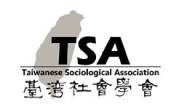.png)
新人發聲:離港來台篇
文/梁展章 Mario Liong
(國立臺北大學社會學系副教授Associate Professor, Department of Sociology, National Taipei University)
I have been researching and teaching social science and gender studies at the tertiary level since 2008. I am now teaching sociology and gender courses at the Department of Sociology at National Taipei University. Before joining National Taipei University, I worked as a post-doctoral researcher at Umeå Centre for Gender Studies in Sweden, taught gender and media at Centennial College in Hong Kong, and gender studies and sociology at Ritsumeikan University in Japan. My main research focus is the critical studies of men and masculinities, with an emphasis on intimate relationships. I am interested in understanding the dialectical construction between the socio-cultural structure and individuals’ gender values and practices. In particular, my work examines the process of agents’ negotiation of gender choices within the structural limitations.
My Ph.D. project is an ethnographic study of the gender construction of Chinese fatherhood in Hong Kong. The study examines the dynamics between structure and agency in the perpetuation of and resistance to conventional fatherhood in the Chinese cultural context. I analyze how fathers understand the notion of “caring fatherhood,” especially in times of family crises, such as unemployment and divorce. The fieldwork included participant observations at a men’s social services centre, and in-depth interviews with 30 heterosexual Chinese fathers who came from different classes, marital, and family backgrounds. In 2011, I joined a research team of the Gender Research Centre of the Chinese University of Hong Kong to conduct a commissioned project by Equal Opportunities Commission, Hong Kong, to explore men’s situation in relation to the existing socio-economic conditions. Based on the data from both projects, I published a monograph, Chinese Fatherhood, Gender and Family: Father Mission (Palgrave Macmillan, 2017), which addresses the ways Chinese men make sense of and practice fatherhood within the context of changing gender conventions and socio-cultural conditions.
I have also conducted a research project examining how transnational migration shapes gender ideology and practice in the families of Chinese immigrant academics in Sweden.
Migration to Sweden was found to intensify gender conventions within the interviewed families because it was often the husband who initiated the migration because of his career plans, such as pursuing Ph.D. degrees or taking research and teaching positions. However, the transnational network helped the women adapt to the new environment more easily, and the gender-sensitive parental leave and childcare policies in Sweden helped the Chinese mothers to have less childcare burden. Apart from my specialization in the Chinese family and parenthood, I have extended my research endeavour to study the construction of gender in popular culture. In a collaborative project using textual analysis and focus group, I analyzed the sexualized media culture in Hong Kong and the way consumption of sexualized images in popular culture shaped the performance of masculinities. I have also conducted quantitative research studies examining gender and sexual subjectivity in the practice of sexting in Hong Kong and Japan.
Currently, I am conducting a research project exploring how intimate relationships of young Hong Kong migrants in Taiwan are shaped by and are negotiated in the migration process and in relation to the socio-political context of the transnational space. The political protests in the recent decade in Hong Kong created a significant division between those who supported the democratic political reform and those who opposed the disruptions of social stability caused by the protests. This division also spread to family, peer, and romantic relationships. Political turmoil turns intimate relationships into either a safe haven for receiving emotional and practical support among those who have supportive partners, parents, siblings and friends, or a site that brings about tremendous conflicts if their intimate others hold a different opinion. As indicated in the preliminary findings of the interviews with some young Hong Kong migrants, many of these young people recently moved to Taiwan to escape from the deterioration of political freedom in the city, and have to leave their family members, friends, and intimate partners behind. Some of them became emotionally closer to their parents and siblings because of the separation; some developed strategies in managing their relationships with their intimate others who shared a different political view from them and opposed to them leaving Hong Kong. Intimacy plays an important role in the lives of these young migrants. On the one hand, those who found an intimate partner in Taiwan have a stronger aspiration in settling down in the host country. On the other hand, some experience the uncertainty of whether they can continue living and working in Taiwan before obtaining the permanent residency and citizenship, which influences the willingness and ability of these young migrants to build a romantic relationship in the host society. As the project continues, it will reveal more diverse intimate experiences of these young migrants and yield a clearer understanding of the relations between transnational migration, intimate relationships, and socio-political condition.
Like many social scientists, I find the process of knowledge production both challenging and enjoyable not only because the acquisition of new understanding satisfies my curious mind, but the findings can uncover the often neglected lived experiences in the society. Through research and teaching, I endeavour to contribute to building an inclusive society and inspire my students to develop their potentials which they find useful even after they go out of the classroom.



